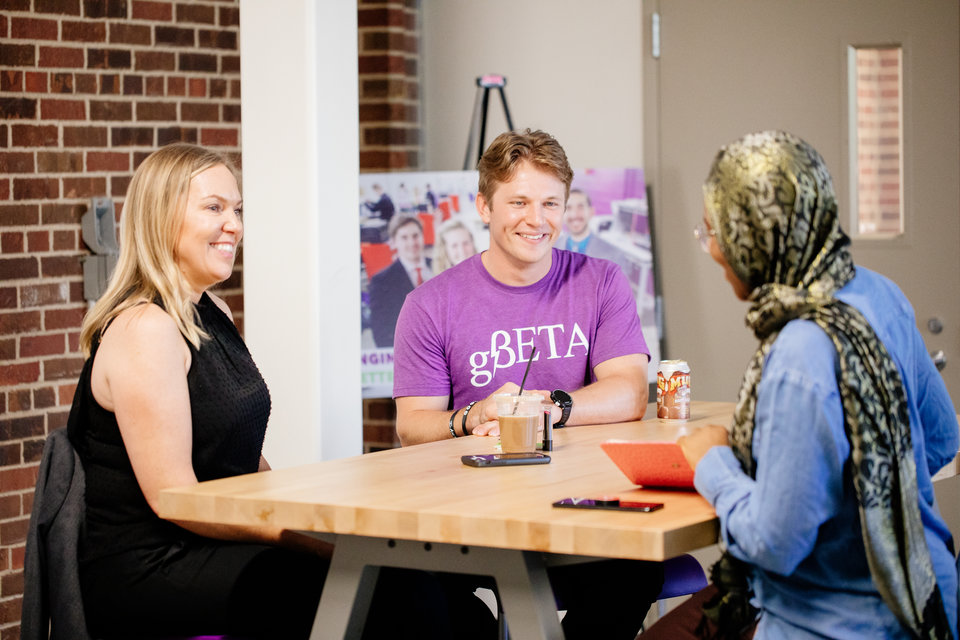Rachael Rinehart has worked in the dairy foods industry for the last four years and has witnessed firsthand the innovation happening in premium pint ice cream. She noticed these indulgent ice creams filled with cookies and brownies and other confections taste good, but can make your feel tired and bloated afterward. This led Rinehart – a part-time MBA student at Opus College of Business – to create a twist on premium ice cream by adding essential oils to the mix. The result is Moody’s Ice Cream, which she’s introduced to Twin Cities consumers through select pop-up events.
“I wanted an ice cream that was better for you with pure plant extracts and mood-boosting properties so you can feel super awesome while you're eating it. As you digest it throughout the day, the oils continue to diffuse,” Rinehart said. “The benefits are prolonged – you don’t just feel them in the moment you’re eating.”
During one of her MBA classes this spring, Rinehart found out about gBETA – a partnership with the Schulze School of Entrepreneurship and gener8tor, a nationally ranked start-up accelerator. A free seven-week accelerator for early-stage companies, gBETA is available to St. Thomas students and alumni. The program received 40 applicants this spring and six were picked from that pool to be part of the inaugural cohort that kicked off in July.
“We are blessed at St. Thomas with a range of world-class resources for students and alumni who are serious about launching their ventures," said Laura Dunham, associate dean of the Schulze School of Entrepreneurship. "gBETA is an important new addition to those resources, providing the kinds of intensive support, mentoring and networking that can greatly enhance the success of a young venture as it is launching.”
Creating, building
Throughout the program, companies meet four to five times a week on campus where they are coached, mentored and attend learning sessions. It all culminates with Pitch Night at 5:30 p.m. on Sept. 5 at the Anderson Student Center where participants have an opportunity to present their businesses to investors, community members and other interested parties. The event is open to the public. Jake Smith '18, gBETA's director, said the evening is primarily about community building along with creating a network and building investor relations.
Smith said he plays a variety of roles in his job as director, including business consultant, psychologist, cheerleader and fan to the teams.
“We want to create a mindset. Often people starting their own business have no idea what they're doing and we're here to say that's OK,” Smith said. “We're here to start identifying lighthouses in the fog. We want to help craft ways to keep moving along. We want to bring in notable perspectives, seasoned veterans and serial entrepreneurs. We want to bring the mentors into the space so they can help identify what the product is and where it actually fits. We want to give the teams a space to ask the really hard questions.”
'It comes down to the connections'
Colin Mihm ’11 is one of the founders of The Tiny Tap, a mobile Prosecco truck that is on track to do about 40 events this year including weddings and corporate happenings. He said the weekly mentor sessions – called "mentor swarms" - where teams are introduced to five new mentors each week - have helped the company refine its pitch.
“We've been officially in business just under a year,” said Mihm, who majored in entrepreneurship. "The feedback we’ve taken away from the mentors, coaches and Jake has been the most helpful. The feedback that these individuals have expressed to us has helped shift the way we're driving the company.
“We're trying to grow and scale this business outside of the state of Minnesota,” he continued. “And we're in need of help. We have an advisory board made up of successful entrepreneurs, and we want to have access to more mentors, coaches, potentially funding … in order to help reach our goals. At the end of the day, it comes down to the connections. We've met a lot of talented and intelligent people who are helping us try to drive this business to where we want to take it.”
The goal of gBETA is that one-third of its graduates will go on to participate in a full-time, equity-based accelerator or raise at least $50,000 in seed funds. Smith said gBETA’s connection to the teams doesn’t end after the program is done.
“The seven weeks is a focused time – it’s a sprint,” Smith said. “We want to fly along for the life of your company. We want to be that resource. My hope if for all the teams is that I get to see them each month and support them as they continue to grow.”







